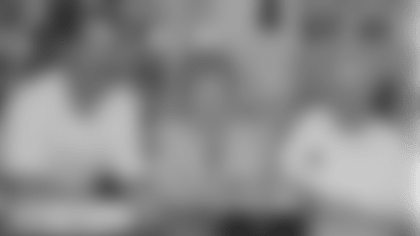Q. At your news conference you said that one of the things you did during the bye week was "spent some time looking at things that are trending in football, things that are going on outside of us that we are very much a part of. Trends in the game, how the game is being played globally." Can you give some examples as to what you meant?
A. Over time, trends change and change quite a bit, just the nature in which the game is being played. What is base personnel, for instance? Each year, particularly in recent years, we have been talking about how significant that third cornerback is. Mike Hilton is a third cornerback for us, and so he's starter-like because of the nature of three wide receiver sets in today's game. So you look at some of those things – how much your nose tackle is playing, how valued that position is, how often opponents are in their base defense, what are some of the other things a nose tackle can do to add value to his cause in terms of helping us win.
It's the same thing with the fullback position. We have a quality fullback in Rosie Nix. What are some of the other things Rosie can help us do when we're not in that structured offensive personnel group? Rosie is a quality special teamer. He's a great kick coverage guy, so he adds value to his cause. You look around and see what other like-bodies are doing to supplement their causes. What are other fullbacks in other cities doing to help their team? We might be able to learn something in terms of what we might use Rosie for. What are some of the other things nose tackles in other 3-4 cities are doing to supplement their workload since there is so much three-wide-receiver sets? So you look at a lot of things in terms of trending. Some of it is low-hanging fruit. Yes, scoring is up, passing yards are up, and all of that. The game is legislated that way, and you could've predicted that back in June just in terms of the points of emphasis relative to the rules. I'm talking about some of the more subtle things, looking around for some of the great ideas, utilization of people, the division of labor in an effort to add value to what everybody brings to our efforts.
Q. You have often said that you believe your job is giving the players what they need at a particular time. What does Artie Burns need at this particular time?
A. More snaps. I mean what I say – you gotta have a stomach in the National Football League and particularly at the cornerback position. The more he can get out there and fight, and fight through the adversity and smile in the face of it – the more he shows he's capable of that, the more he'll be able to push through this time period that he's going through. It's funny. Often when Ike Taylor and I visit and revisit his career when he's in town, we talk about how when I got this job in 2007, Ike Taylor was pretty much in the same circumstance as Artie in terms of trying to find his footing as a young starter who was experiencing some struggles. Ike smiled in the face of that adversity and worked his tail off, and he worked through it, and then he had a long and prosperous career here. Artie's going to be given the same opportunity. He has to display that same competitive spirit and mettle that allowed Ike to have the type of career he had for us.
Q. Can you help a guy learn to smile in the face of adversity, or is it something Burns has to come to on his own?
A. You can help a guy by recognizing what it is and recognizing what he needs. What he needs is more reps. He doesn't need coddling. He needs to be challenged, but at the same time he needs an opportunity to rebound and respond, because that is the nature of the game and this business. When you play cornerback in our game, there is a reason why they have a scoreboard in every stadium – because cornerbacks give up touchdowns.
Q. What has Jon Bostic been contributing to this point in the season, and has he been giving the defense what it needs from him?
A. His role is continually evolving, and that's one of the things I'm talking about when I talk about looking around at global things. That base inside linebacker, particularly when you're playing as much sub-package as you play, what are some of the other things he can do to add value? Bostic does a great job finding roles on special teams and being a contributor there. He's also playing in some sub-package ball. He showing potential for having some pass-rush abilities – he's got a few sacks for us. So we're still carving out that niche. It's good that he's a sharp guy, because that helps in terms of being able to put him in different places and allowing that to continue to evolve.
Q. If I were to ask you about your No. 3 receiver, is that in your mind just a spot on the depth chart, or is it a specific role for a player with a specific skill-set?
A. I think it means different things in different conversations. The No. 3 wideout can simply mean the first guy off the bench. It can also mean the guy who plays inside specifically, the guy who plays in the slot. Or it can simply mean situational. When you think about our third receiver, you think situational. That's because we're flexible, we've always been position flexible in terms of having the ability to move people around as we saw fit. And Hines Ward set that standard here years ago, because Hines Ward was a Z-receiver, but Hines Ward was a guy who played inside on possession downs like a third receiver even though he was not. So we've always had that mentality of movable or exchangeable parts. You'll see Antonio Brown inside some, you'll see JuJu Smith-Schuster inside some, you'll see us bring in Ryan Switzer some and play him inside. We have a lot of flexibility in terms of that "third wide receiver." It could be a myriad of people. Sometimes in our vertical passing game it could be Darrius Heyward-Bey. We've always taken a situational approach to that, and I think it lends itself to us being less predictable and being more inclusive in terms of utilizing all of our guys.
Q. When it comes to instant replay challenges, is there a situation or a type of play where it's more difficult to win the challenge than other situations or types of plays?
A. Certainly. The line to gain is a really difficult play to win with a challenge, and you know it going in. Sometimes you even challenge it just for the psyche of your men, so that they can move on. You often know it takes some significant visual evidence to get a line to gain, or a spot, changed in a football game. That being said, even though there are some times you're looking at something and you know the ball was mis-spotted, you have to make them make the tough decision.
Q. Do you have a system or a procedure that you use in deciding what to challenge and whether to challenge?
A. I do, but the rules of it change based on certain variables, venue being one of those variables. On the road, you're not going to get the benefit of replays and so you have to make quick decisions and so forth. You have to make quicker, probably riskier decisions in road game environments than you do in home game environments. Or when you have the ball.
Q. You mentioned challenging a play "for the psyche of the men." Do you do that often?
A. Not very often, but I'm open to it. Sometimes controversial plays, particularly from the perspective of the players on the field when they think they saw something, and they're trying to help you with things on the opposite side of the field in terms of the line to gain and is somebody inbounds or out of bounds, you have to help and be willing to be supportive of them and lean on what they think they saw from time to time.
Q. Like when Antonio Brown says he got his two feet down along the sideline during a catch?
A. When AB says he got his feet down inbounds, I'm going to support that. I've been in enough situations with AB over the last decade to feel comfortable with that. That is a classic example. We were in Cincinnati a couple of years ago, and he assured me he got his feet down inbounds, and it was along our sideline, and I thought he didn't. And I supported him. And I was wrong. He was in, and I was glad I did challenge.
Q. Do you believe in saving a challenge for the second half regardless of what might happen in the first half?
A. I do. There is certain significance in plays and a lot of that significance has to do with how much time is left in the game after those plays. Often times things that happen in the first half of games, regardless of what they are, there is a sufficient amount of time to overcome it or circumvent it.
Q. Some teams have hired guys, either to be on the sideline or in the booth to help the coach with challenges. What's your opinion on that?
A. I'd like to have that job, to work 12 months a year for maybe 1.2 decisions a week. That sounds like a good job, doesn't it? I'm not going to hire somebody specifically to do that job. I don't care how many times I get asked about challenge circumstances in press conferences. I could care less. I'm not going to hire somebody exclusively to sit up there and watch a football game and help me make 1.2, on average, decisions per football game.
Q. You say often when asked about where your team is, or if you like where the team is, that "We're only trying to get better every day." How is that accomplished, the getting better every day? If I'm a player, what should I be doing in the effort to get a little bit better every day?
A. I'm so glad you asked that, because I routinely express the "how" to our guys because it's important. It's not only important to state what needs to happen, but it's important to talk about how it needs to happen and then walk them through it on a daily basis. We have to get better in terms of football knowledge, because knowledge helps us situationally. Certain circumstances are won based on knowledge. Prior to the ball being snapped, you have to acknowledge that. I've never been around a great player who's not situationally football smart. They have to be aware. They have to have great awareness, and awareness is learning from repetition. So there's muscle memory associated with playing. You have an in-helmet perspective on a situation, and so the more times we snap the ball you get exposed to it, and that awareness helps you make plays. The last thing is technical, and that's muscle memory as well. The hand placement associated with combat, hand usage relative to your position, footwork, etc. These guys have to execute these detail-oriented tasks under extreme duress, and really the only way people function under duress is through repetition. And that's what I mean when I say we have to clock in to work every day, because when we're in stadiums on Sundays there are certain stresses and duress associated with that, and it has to run like water. So, come in every day being focused, working, being open to growth, with that growth being both above the neck and below the neck, which is a recipe for those guys both individually and collectively.














